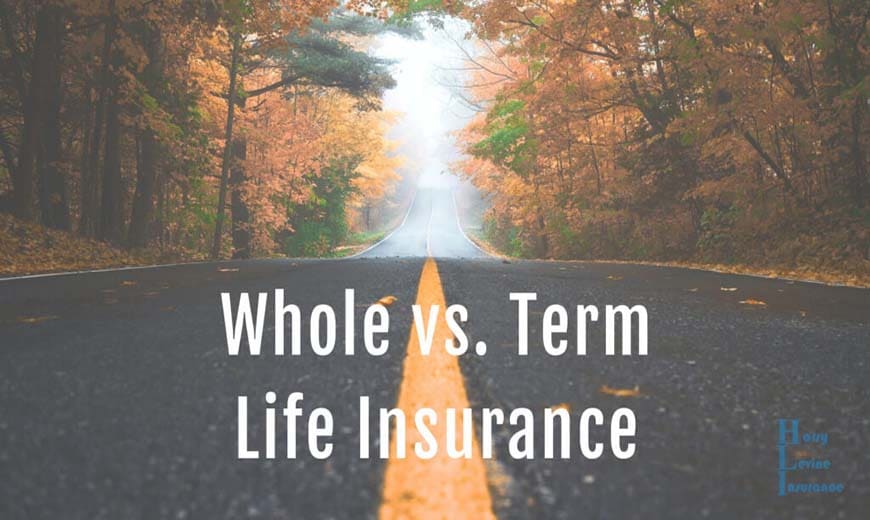You know you need insurance, but which kind do you choose?
Knowing the key differences between term life vs whole life insurance can help you decide.
If your insurance agent hasn’t talked to you about life insurance yet, they should!
Having life insurance coverage is one of the best ways to protect your family against financial hardship after you’re gone, yet a surprising amount of people don’t have this vital policy.
If you’ve looked into life insurance recently, you may have been a bit overwhelmed. “Whole life insurance? Term life insurance? Why are there so many types of life insurance?!”
We get it: life insurance can be confusing. But that’s why we’re here! Let’s take a closer look to better understand the difference between term life and whole life insurance.
What is Term Life Insurance?
Life insurance is a type of insurance policy that pays out upon the policyholder’s death. The way term life insurance works, your beneficiaries only receive the payout if you pass away during a certain time frame (that is, the term).
When you purchase a term insurance policy, you receive coverage for a set number of years (that you get to choose). Term life policies typically last 20 or 30 years. If the term expires without being used, you have the choice to apply to renew your policy, convert it to a whole life policy (more on that later), or simply let your coverage cease.
One of the biggest benefits of term life insurance is that it is one of the most affordable types of life insurance, with premiums being calculated based on the payout amount as well as your life expectancy. For this reason, many life insurance companies will gather in-depth personal information (smoking habits, driving record, family history, etc.) or even require you to undergo a medical exam before you can purchase coverage.
If you pass away while the policy is still active, your beneficiaries will receive a death benefit which they can use to pay your outstanding debt, funeral and burial costs, and any other living expenses affected by your demise. Beneficiaries can even use life insurance funds to go back to school, secure housing, and cover numerous other critical expenses.
What is Whole Life Insurance?
Whole life insurance, on the other hand, is a type of permanent life insurance that provides lifelong coverage for additional peace of mind.
Because coverage lasts so much longer, whole life policies are often more expensive than term life (up to 10 times more). But this higher cost comes with an added benefit: a policy with a cash value component.
Every time you pay your premium on a whole life policy, the insurance company puts part of it into an interest-bearing account. This becomes the cash value of your policy. Your policy’s cash value grows at a guaranteed rate with every payment you make.
What does this mean for you?
You can either take out policy loans (which can come with associated fees) or cancel your policy and collect the current value in cash. Some policies also earn dividends, which are a portion of the insurance company’s profits that get paid out to policyholders.
If you purchase a whole life insurance policy that pays dividends, you have a choice as to how to use those dividends. You can either receive dividends annually as cash, leave them alone and let them build interest, or use them to reinvest in your policy (by using them to pay premiums or buy more coverage).
Other Types of Life Insurance
When it comes to life insurance, you have more options than just whole life vs. term life insurance.
Indexed universal life insurance is similar to a whole life policy, but offers more flexibility in terms of your premium payments and death benefits. Variable life insurance is also similar to whole and universal policies, but they are tied into investment accounts and require a bit more hands-on management.
Term Life vs Whole Life Insurance: Deciding What’s Best
As with any policy, there are pros and cons to both types of life insurance.
When looking at whole life vs term life insurance, the biggest difference is the length of the term.
If you only need to provide for your beneficiaries while your children are young, for example, you may want to buy a term life insurance policy to protect them during those years. For a more long term approach to help with estate planning, inheritance taxes, and other expenses, a whole insurance policy would be best.
Whole policies do cost significantly more than term policies, but because they build cash value, you can get some of this money back in the form of dividends or borrow against the cash value of the policy if you need it.
And if you cancel the policy, you will receive your cash value as a lump sum. If you cancel a term policy, you don’t collect anything.
However, even if finances are a consideration, premium payments should never be your primary concern.
When it comes to insurance policies, you get what you pay for and life insurance is designed to compensate for the loss of your contribution to the family—whether that’s your earning potential or the role you play as a homemaker.
Before you make a decision about which type of life insurance to purchase, ask yourself:
- When you need coverage and
- How much coverage you need.
The answers will help you and your insurance agent land on a policy that best protects your family.
Looking for life insurance? Give us a call! As an independent insurance agency, we have the freedom to connect you with life insurance policies from multiple companies to find the option that works best for you.









Comments (5)
Clare Martin
November 18, 2023Thank you for explaining to us that with life insurance, our beneficiaries will receive the payout once we pass away during a certain time frame since term life policies usually last 20 or 30 years before they are renewed if they expire without being used. I’m in my mid-30s now, and since I’m a single mother of two kids, I plan to prepare my life insurance plan soon just in case something happens to me. I’ll be sure to remember this while I look for a life insurance company in Boynton Beach to contact for inquiries soon.
Elle Jones
November 2, 2023Considering that a term life insurance policy builds cash value, I thought it was interesting that you mentioned that you could receive some money back in the form of dividends. We’ll keep this advice in mind as my spouse and I prepare to buy a life insurance policy to safeguard our two children’s futures. Your advice is helpful to us because we want to make sure they would have sources of income if we passed away too soon.
alisa
October 7, 2023i need whole life quote for myself and spouse
Julie Levine
October 9, 2023Hi Alisa,
We will email you privately so we can help you with quotes. Thank you for reaching out to us!
Shammy Peterson
September 17, 2023What stuck out to me the most was when you said that you could get some money back in the form of dividends when you consider a term life insurance policy because it builds cash value. My husband and I will remember this tip because we are planning to purchase a life insurance policy to protect the future of our two children. We want to ensure that they would have sources of income should we pass away early on, so your tips are helpful to us.